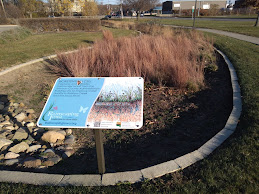 |
| Our Iowa River, with stormwater outlets |
Earlier this month marked the 50th anniversary of the passage of the federal Clean Water Act, the very successful piece of legislation that regulated "point source" water pollution; that is pollution that is discharged from specific locations like factories, municipal wastewater facilities, and other industrial sources.
It does not, however, cover "non-point sources" such as stormwater runoff (including agricultural runoff), which has led to the persistent poor quality of Iowa's rivers and streams, with impacts downstream as far away as the "dead zone" in the Gulf of Mexico. Think of everything applied to farm fields, lawns, streets and highway--manure and fertilizer, pesticides, salt and other chemicals--all flowing into our river and points beyond. Seems like quite an oversight when talking about "Clean Water," doesn't it?
Green infrastructure systems like the Sycamore Greenway help mitigate this runoff by collecting water from surrounding neighborhoods and letting it infiltrate into the ground--the water seeps in and pollutants are filtered out before the water reaches larger streams and rivers. A small-scale example can be seen with bioretention cells or rain gardens, like the one at the Johnson County Administration building. Individuals can construct small-scale rain gardens to help capture runoff from residential properties.
At a much larger scale, agricultural buffer strips planted along waterways perform a similar function, capturing and slowing runoff into our streams as they filter out pollutants. Because there is no Clean Water Act for non-point pollution much of these mitigation tactics are voluntary, with mixed results (to put it mildly).
Is it time for such a thing? Over a decade ago Iowans voted overwhelmingly for the Natural Resources and Outdoor Recreation Trust Fund to establish permanent funding for water and soil quality improvements as well as outdoor recreation and wildlife habitat yet it remains unfunded. Iowans know how important water is, and we want it to be protected.
Legislators, however, fail to understand how water connects us all. There is no such thing as private property when it comes to water: what you put on your land will inevitably flow to someone else's land (if you stockpile manure, for example, and it washes into a stream after a heavy rain...that manure isn't just your problem but a problem for everyone downstream of you). The success of Clean Water Act in controlling point-source pollution shows what can be done when the will is there.
Our waterways haven't been receiving much attention this election season. Who will advocate for them if not us? Ask candidates what they will do to protect our waterways. Hold them accountable. Let's get a Clean Water Act for the 21st century.

No comments:
Post a Comment